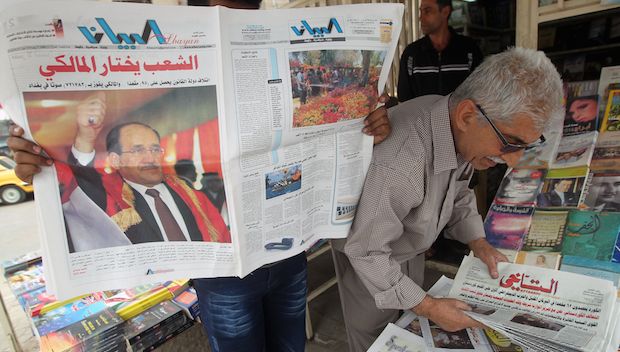
An Iraqi man reads a local newspaper the day after results revealed that Iraqi Prime Minister Nuri Al-Maliki won the most seats in parliamentary elections, in Baghdad on May 20, 2014. (AFP PHOTO/AHMAD AL-RUBAYE)
Baghdad, Asharq Al-Awsat—Iraq’s electoral authorities announced the preliminary results of the country’s parliamentary elections on Monday amid mounting tension in the capital.
Incumbent prime minister Nuri Al-Maliki’s State of Law coalition fell short of an outright majority but won the largest number of seats, taking 92 out of the 328 seats in parliament. The Al-Muwatin bloc, led by Ammar Al-Hakim of the Islamic Supreme Council of Iraq (ISCI), came in second with 29 seats, with the Sadrist Al-Ahrar bloc taking 28.
Maliki’s attempts to broker a coalition to form a government that would give him a third term are likely to be complicated by attempts to challenge the results of the poll, which was held three weeks ago.
The Sadrist Movement, led by prominent Shi’ite cleric Moqtada Al-Sadr, announced it would not be silent about what it said were serious cases of electoral fraud. Its claims were echoed by Iyad Allawi, the leader of the Wataniya bloc, which won 21 seats.
Jawad Al-Jubouri, a spokesman for Al-Ahrar, told Asharq Al-Awsat: “The results were surprising to us because they did not match the reality or our partners’ initial expectations . . . The next step is to appeal the results before the Iraqi judiciary, and we trust the fairness of the judiciary. In addition to that, we call on the UN and the EU to investigate the facts.”
He added: “We have irrefutable evidence and documents which prove the dishonesty of the elections, and the violations that took place make it difficult for any wronged party to accept the results.”
The previous two days have seen a security crackdown in Baghdad, in the run up to the announcement of the results.
The Iraqi security services’ Baghdad Operations Command denied that the additional security measures were connected to the publication of the election results, saying they were connected to the forthcoming commemoration of the death of Imam Kadhim, which is observed by millions of Iraqi Shi’ites every year.
Maliki’s State of Law coalition rejected the accusations of electoral fraud. One of the coalition’s MPs, Sadiq Al-Labban, told Asharq Al-Awsat: “The results matched expectations, and we in the State of Law achieved first place in these elections. Any talk about forgeries or violations is exaggerated and does not rely on facts or evidence.”
Labban added: “Our next task as the State of Law is to strengthen the National Alliance to which we are affiliated, because as a National Alliance we have won 170 seats . . . However, we will not monopolize authority and we will open the door wide to be able to form a government very quickly.”
But Labban said discussions would be held within the alliance about the State of Law’s insistence on nominating Maliki for a third term as prime minister, which is opposed by some members.
He said: “This issue will be discussed openly and transparently, but the priority is how to strengthen the National Alliance in an institutional manner. After that we will discuss our candidate, and our partners within the alliance will have their candidates, and we must agree on an acceptable formula in this regard which is acceptable to all.”
Meanwhile, representatives of the Kurdish parties said they did not expect the next government to be formed easily, and that they would seek to deny Maliki a third term.
Kurdistan Alliance MP Shawan Mohammed Taha told Asharq Al-Awsat: “The political scene in Iraq is very complex, and the elections were expected to be part of a solution to the crises. However, what we see now and what we can expect in the coming period is that the election results will be part of the problem.”
Taha added: “If I want to talk about the Kurdistan Alliance, our position is clear—and we have strong partners such as the Sadrist Movement, Wataniya and Mutahidoun—which is not to allow Maliki a third term . . . The government would not be formed if the region’s countries do not intervene, in addition to the international factor, which means its formation is linked to internal and regional agreements.”
Mohamed Al-Khalidi, the secretary of Iraq’s parliament and a leader of the Sunni Mutahidoun bloc, echoed claims of widespread electoral fraud and said his party was also determined to deny Maliki another term as prime minister.
“There is agreement on not renewing Maliki’s term because we, along with the Kurdistan Alliance, Al-Ahrar and Muwatin, have a two-thirds majority, which is more than 225 seats—enough to decide the [shape of the next] government.”
Negotiations over the next government are expected to take months to resolve. The previous elections in 2010 were followed by 10 months of talks between the factions before Maliki was able to form a government.
